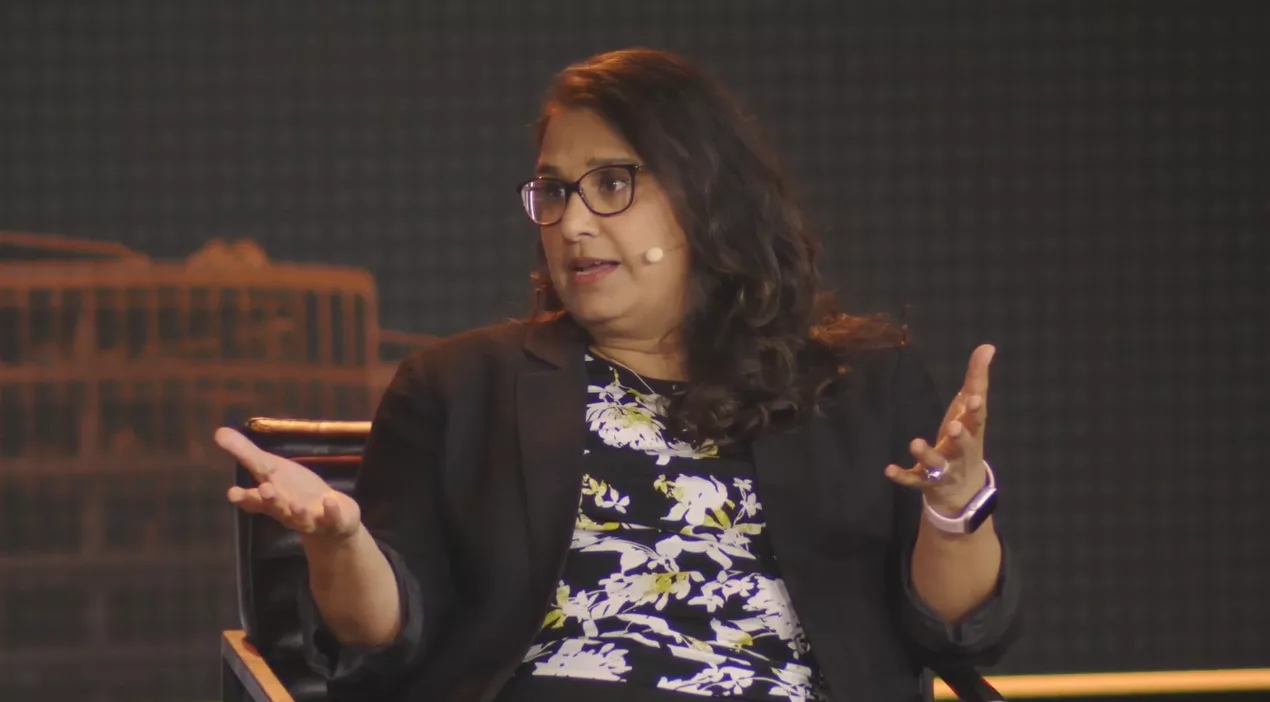|
Getting your Trinity Audio player ready...
|
Just before lunch on Day 1 of the London Blockchain Conference (LBC) attendees were treated to an insider insight into how and when blockchain technology might be taken up by the masses, and the role big tech will play in this process.
The issues under discussion at the pre-lunch business stage panel were the mainstream integration of blockchain technology and how big tech plans to allow blockchain solutions be rolled out on their platforms.
Market leaders such as Apple (NASDAQ: AAPL), Google (NASDAQ: GOOGL), Meta (NASDAQ: META) and Microsoft (NASDAQ: MSFT) will likely be the deciders when it comes to the mass adoption of blockchain technology, and in the grand hall of the QEII conference center four industry insiders discussed the implication of this for blockchain, big tech and general users.

“Our mindset is we need to onboard the next 1-2 billion people to the Web3 space,” said Alex Matsuo, a fitting panelist to speak to big tech’s role in the uptake of blockchain from his position as EMEA Web3 developer with tech giant Amazon Web Services.
Matsuo went on to explain how Amazon is approaching this onboarding process, by talking to all kinds of digital asset players from “two mates in a garage creating the next unicorn” to companies at the top of the market, in order to get a picture for how this mass adoption could be achieved.
Fellow speaker Joshua Henslee, author and technical editor at CoinGeek, sees the change as coming from the bottom up, rather than from digital behemoths such as Amazon.
“The challenge is that these companies are big so they’re slow… it’s not as fast as the individual, so in the short terms individuals are going to vote with the chain they use,” Henslee said. He went on to suggest it’s grass roots movement that will lead the way to blockchain’s wider adoption, with big tech catching up only after it gets a “case of FOMO”.
Looking round the diverse and enrapt faces filling the chairs at the LBC business stage it’s easy to see how Henslee might be right about the grass roots leading the way.

The gathered entrepreneurs, tech industry investors, and assorted consumers listening to the panel produced their loudest reaction when the speakers were asked what big companies are doing incorrectly when trying to integrate blockchain technology—a pause was needed to let the laughter subside.
In response to the question, Marcin Dyba, co-founder & CEO of 4Chain, a platform that offers advice and development of turn-key solutions using Web3 technologies, suggested that more time is needed for big tech to adopt Web3.
“We are still at the early stage, the most popular use cases right now are related to tokenization,” said Dyba, who advocated for a sensible solution driven approach to adoption. “It’s important to look at the problem and see if blockchain is the solution, not just integrate blockchain for the sake of it.”
The panel’s fourth speaker, Chief Administrative Officer of financial technology company Qenta, Nirali Shah, emphasized that “thinking about regulation and licensing is important before we think about integration.” This is particularly important in the context of large multinational companies looking to integrate blockchain technology without getting embroiled in the kind of regulatory disputes the digital asset industry has become synonymous with of late.

She broadly agreed with Dyba on a solution-based approach to integration, stating that “Blockchain in itself is not the panacea,” and should be used where needed first, before being applied indiscriminately.
Tokenization of big tech
Shah also spoke of “tapping into a shift towards a token-based economy,” something fellow panelist Henslee was in full agreement with:
“Still, after 14 years, the dominant use case is tokenization and NFTs, this is what the market wants…companies have to look at what users are doing and give them what they want.”
Henslee suggested new big tech projects focused on giving users what they want would be the best way to create a ground swell of support for the uptake blockchain technology. He gave the crowd-amusing hypothetical of Coca-Cola doing glass bottle NFTs, an example he admitted was “silly,” but one that illustrates an attempt to at least give users what they—currently—want.

Total agreement is never desirable for lively panel discussions, and thankfully Dyba had a different take on the way forward. He suggested that instead of relying on new projects “we need more time to get the best out of existing projects, to get them right first.” This will solidify faith in the market and encourage larger players to get involved, once they see well executed use cases in action.
When the discussion turned back to big tech’s slow approach to adoption, Matsuo from Amazon suggested that “at least we should give credit to them for trying. We need to stop thinking about Web2 vs Web3, we need to agree on a vision and walk there together”—a sentiment that drew lots of affirming nods from fellow speakers and audience alike.
Matsuo’s final thoughts also nicely summed up the air of cautious optimism in the discussion, and the room, about the future of broader blockchain uptake, saying “we have to be humble, who knows where we’re going next.”
Watch: Learn how to create the future with blockchain at the London Blockchain Conference

 02-15-2026
02-15-2026 




